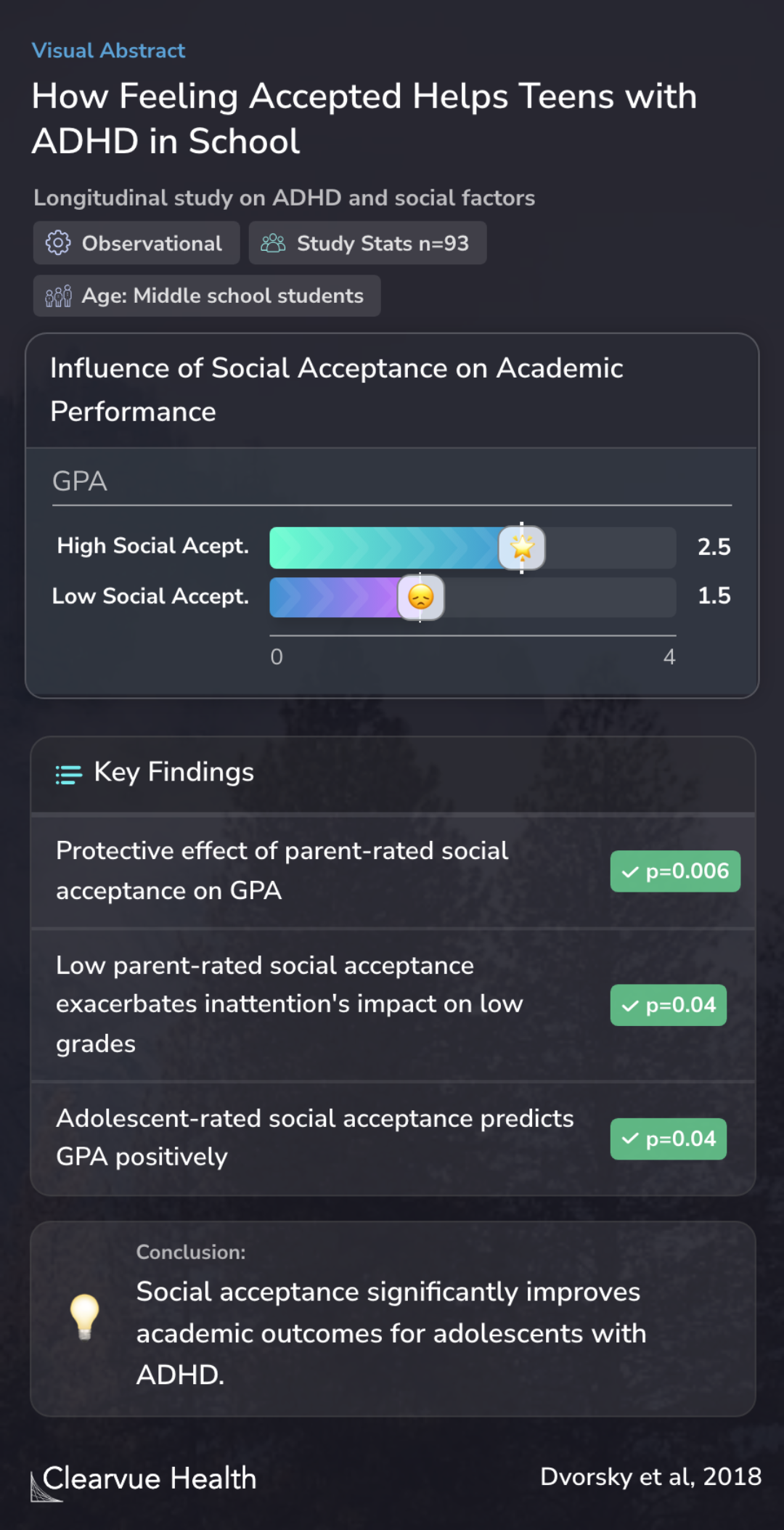The Protective Effects of Social Factors on the Academic Functioning of Adolescents With ADHD
How Feeling Accepted Helps Teens with ADHD in School
Dvorsky MR, Langberg JM, Evans SW, Becker SP

Objectives
The study aimed to explore how well kids with ADHD do in school and why some do better than others. It looked closely at how being liked and being good at making friends might protect these kids from doing poorly in school because of their ADHD symptoms. This is important because not all kids with ADHD struggle in the same way, and understanding what helps some of them succeed can teach us a lot.
There is considerable evidence that externalizing disorders such as attention deficit/hyperactivity disorder (ADHD) put youth at risk for a range of adverse academic outcomes. It is importantly to note that some youth avoid these negative outcomes, yet there is a gap in our understanding...
Methods
The study focused on 93 middle school students who were diagnosed with ADHD. Both the students and their parents shared their thoughts on how well the students could make and keep friends and how much they felt liked by others. The researchers then checked on the students' grades and how well they were doing in school 18 months later to see if there was any link between their social skills, how liked they were, and their academic success.
Participants included a sample of 93 middle school students comprehensively diagnosed with ADHD. Parents and adolescents completed ratings of social skills and perceived social acceptance. School grades and teacher-rated academic impairment were assessed 18 months later as longitudinal a...
Results
The researchers found that kids with ADHD who were liked more and better at making friends tended to do better in school 18 months later. This was especially true for kids who often got easily distracted or were very active and impulsive. If these kids felt accepted and had good social skills, their grades didn't drop as much as those who didn't feel as liked or were not as good at making friends. In simple terms, being liked and being good with people can make a big difference for kids with ADHD when it comes to school.
Inattention and social acceptance were associated with academic outcomes 18 months later. Regression analyses revealed that parent- and adolescent-rated social acceptance demonstrated promotive effects for grades and against teacher-rated academic impairment. Further, social acceptance s...
Conclusions
This study shows that feeling liked and being good at dealing with others could really help kids with ADHD do better in school. This finding suggests that helping these kids improve their social skills and make more friends could be a good way to support their academic success. Other studies have looked into different ways to help kids with ADHD, like using medication to improve how they get along with others or teaching them to be more organized. These approaches aim to help these kids face fewer challenges in school and life.
These findings demonstrate that social acceptance may be an important intervention target for improving academic outcomes among adolescents with ADHD.
Key Takeaways
Context
Some research, like a study done by Abikoff and others in 2004, has looked at whether ADHD medication can help kids with ADHD be better at making friends. This study found that just giving medication didn't really change how well kids could socialize. This means that for kids with ADHD, medication might help with making friends without needing extra social skills training.
Another study by Langberg JM and colleagues in 2011 explored how being organized with schoolwork can help kids with ADHD do better in school. They found that being good at keeping track of homework and remembering materials was linked to better grades. This suggests that teaching kids with ADHD how to be more organized might help them succeed academically.
These studies, along with the current one, show there are many ways to support kids with ADHD in their academic and social lives. Whether it's through medication, social skills training, or helping them be more organized, the goal is to find the best ways to help these kids thrive.